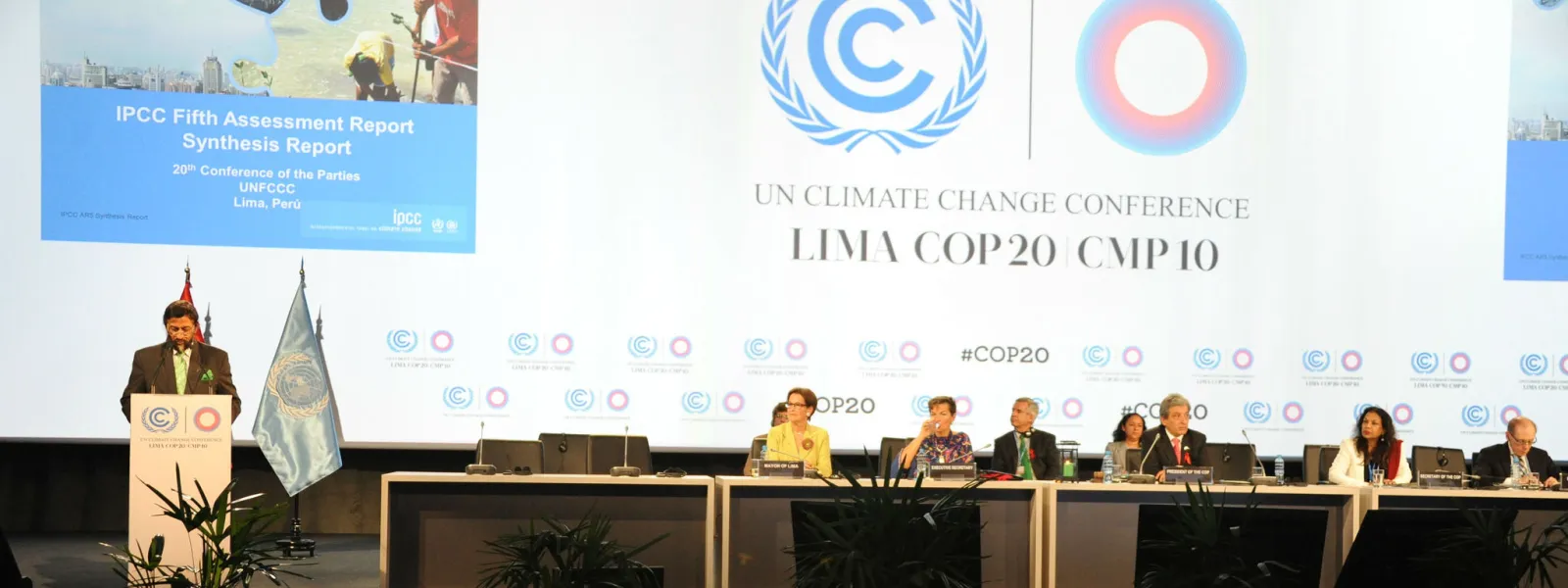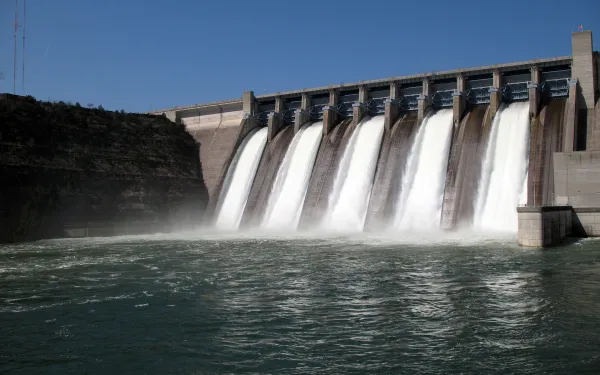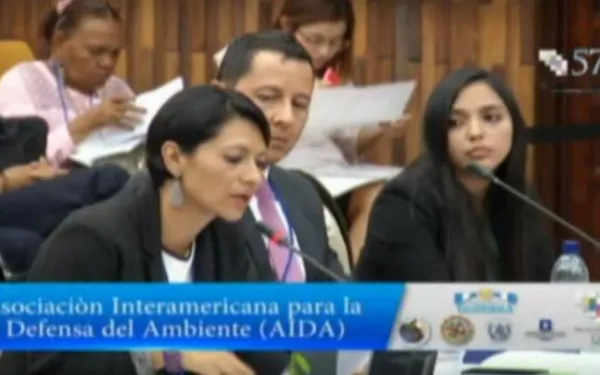
Project
Photo: UNFCCCMonitoring the UN Climate Negotiations
As changes in climate become more extreme, their affects are being hardest felt throughout developing countries. Since 1994, the United Nations Framework Convention on Climate Change has laid out actions to limit the increase of global average temperatures and confront the impacts of climate change.
The States that are Parties to the Convention meet every year in the so-called Conference of the Parties (COP) to review their commitments, the progress made in fulfilling them, and pending challenges in the global fight against the climate crisis.
At COP21 in 2015, they adopted the Paris Agreement, which seeks to strengthen the global response to the climate emergency, establishing a common framework for all countries to work on the basis of their capacities and through the presentation of Nationally Determined Contributions (NDC) that will:
- Limit the increase in global temperatures to 2°C compared to pre-industrial levels and continue efforts to limit it to 1.5°C;
- Increase the capacity of countries to adapt to the impacts of climate change; and
- Ensure that financing responds to the goal of reducing greenhouse gas emissions.
Our focus areas
THE CLIMATE CRISIS AND HUMAN RIGHTS
The climate crisis, due to its transversal character, has repercussions in various fields, geographies, contexts and people. In this regard, the Preamble to the Paris Agreement states that it is the obligation of States to "respect, promote and fulfill their respective obligations on human rights, the right to health, the rights of indigenous peoples, local communities, migrants, children, persons with disabilities and people in vulnerable situations and the right to development, as well as gender equality, the empowerment of women and intergenerational equity."
AIDA at the COP
COP25: Chile-Madrid 2019
At COP25 in Madrid, Spain, we advocated for the inclusion of the human rights perspective in various agenda items. We promoted the incorporation of broad socio-environmental safeguards in the regulation of Article 6 of the Paris Agreement, which refers to carbon markets. We closely followed the adoption of the Gender Action Plan, as well as the Santiago Network, created "to catalyze technical assistance […] in developing countries that are particularly vulnerable to the adverse affects of climate change." We also encouraged the inclusion of ambitious and measurable targets for the reduction of short-lived climate pollutants in the climate commitments of States.
Related projects

Letter: Concerning the Green Climate Fund and large hydropower
The 282 undersigned organizations write to express our significant concern regarding the use of GCF resources to support large hydropower, and, in particular, the following proposals in the GCF’s pipeline: (i) Qairokkum Hydropower Rehabilitation, Tajikistan; (ii) Upper Trishuli-1, Nepal; and (iii) Tina River Hydro Project, Solomon Islands. The GCF can and should help pay for the incremental costs of renewable energy sources, which are often less “bankable” (though less so all the time). However, we wish to highlight that large dams are different from wind, solar and other technologies because they fail to fulfill the GCF Investment Criteria. For example: (i) Impact potential: Dams emit significant amounts of greenhouse gases, particularly methane, and damage carbon sinks; (ii) Paradigm shift potential: Large hydro is a non-innovative technology that has not seen significant technical or financial breakthroughs in decades; (iii) Sustainable development: Dams have high negative co-impacts with regard to the environment, human rights, and economic cost. By interrupting rivers and flooding lands, they irreversibly harm livelihoods and ecosystems. Because they routinely cost double their estimates, large dams stretch government budgets and increase borrowing costs; (iv) Needs of the recipient: Hydropower projects are particularly vulnerable to climate change, and many countries are already alarmingly over-dependent on hydropower (as is the case with Tajikistan and Nepal). GCF should support efforts in these countries to diversify their energy mix, helping them improve their resilience and adaptive capacities; and, (v) Efficiency and effectiveness: Dams all over the world are losing generation capacity because of climate change-induced droughts. In addition, each of the dam-related projects in the GCF’s pipeline suffers significant deficiencies: Qairokkum Hydropower Rehabilitation: This funding proposal is expected at the April board meeting. The board should reject it. The project aims to extend the life of a Soviet-era dam, built in the 1950s. It is not innovative in any way, deepens Tajikistan’s already alarming overdependence on climate-vulnerable hydro, and fails to address critical environmental problems of the original dam, among other concerns. Upper Trishuli-1: Though not up for consideration at the April board meeting, Upper Trishuli has been in the project pipeline for many months and should be expeditiously removed from it. With more than 30 hydro projects either operating, in construction, or planned on the Trishuli River, the project would have no transformational impact. It faces severe climate and disaster risks, would deepen Nepal’s overdependence on climate-vulnerable hydro, and would have significant impacts on indigenous communities and the environment that have not been adequately studied or addressed. There is also no assessment of the project’s vulnerability to earthquakes, despite the area being highly seismic. Tina River Hydro Project: Expected at the April board meeting, this 15 MW project is intended to reduce the Solomon Islands’ reliance on imported diesel. The project does not include an assessment of climate vulnerability, threatens a world-class biodiversity hotspot, and is very costly. Meanwhile, Solomon Islands has considerable renewable energy potential that has not been sufficiently studied. These issues and others are detailed in a letter sent previously to the Board. Thank you for your attention to this most important matter. We look forward to working with you and the Secretariat to ensure that the GCF is a transformational institution of the highest social and environmental caliber. That cannot be accomplished if the GCF finances large hydropower.
Read more
Letter: Concerning the Green Climate Fund and large hydropower
The 282 undersigned organizations write to express our significant concern regarding the use of GCF resources to support large hydropower, and, in particular, the following proposals in the GCF’s pipeline: (i) Qairokkum Hydropower Rehabilitation, Tajikistan; (ii) Upper Trishuli-1, Nepal; and (iii) Tina River Hydro Project, Solomon Islands. The GCF can and should help pay for the incremental costs of renewable energy sources, which are often less “bankable” (though less so all the time). However, we wish to highlight that large dams are different from wind, solar and other technologies because they fail to fulfill the GCF Investment Criteria. For example: (i) Impact potential: Dams emit significant amounts of greenhouse gases, particularly methane, and damage carbon sinks; (ii) Paradigm shift potential: Large hydro is a non-innovative technology that has not seen significant technical or financial breakthroughs in decades; (iii) Sustainable development: Dams have high negative co-impacts with regard to the environment, human rights, and economic cost. By interrupting rivers and flooding lands, they irreversibly harm livelihoods and ecosystems. Because they routinely cost double their estimates, large dams stretch government budgets and increase borrowing costs; (iv) Needs of the recipient: Hydropower projects are particularly vulnerable to climate change, and many countries are already alarmingly over-dependent on hydropower (as is the case with Tajikistan and Nepal). GCF should support efforts in these countries to diversify their energy mix, helping them improve their resilience and adaptive capacities; and, (v) Efficiency and effectiveness: Dams all over the world are losing generation capacity because of climate change-induced droughts. In addition, each of the dam-related projects in the GCF’s pipeline suffers significant deficiencies: Qairokkum Hydropower Rehabilitation: This funding proposal is expected at the April board meeting. The board should reject it. The project aims to extend the life of a Soviet-era dam, built in the 1950s. It is not innovative in any way, deepens Tajikistan’s already alarming overdependence on climate-vulnerable hydro, and fails to address critical environmental problems of the original dam, among other concerns. Upper Trishuli-1: Though not up for consideration at the April board meeting, Upper Trishuli has been in the project pipeline for many months and should be expeditiously removed from it. With more than 30 hydro projects either operating, in construction, or planned on the Trishuli River, the project would have no transformational impact. It faces severe climate and disaster risks, would deepen Nepal’s overdependence on climate-vulnerable hydro, and would have significant impacts on indigenous communities and the environment that have not been adequately studied or addressed. There is also no assessment of the project’s vulnerability to earthquakes, despite the area being highly seismic. Tina River Hydro Project: Expected at the April board meeting, this 15 MW project is intended to reduce the Solomon Islands’ reliance on imported diesel. The project does not include an assessment of climate vulnerability, threatens a world-class biodiversity hotspot, and is very costly. Meanwhile, Solomon Islands has considerable renewable energy potential that has not been sufficiently studied. These issues and others are detailed in a letter sent previously to the Board. Thank you for your attention to this most important matter. We look forward to working with you and the Secretariat to ensure that the GCF is a transformational institution of the highest social and environmental caliber. That cannot be accomplished if the GCF finances large hydropower.
Read more
My time before the region's leading court on human rights
“Our deepest fear is not that we are inadequate. Our deepest fear is that we are powerful beyond measure. It is our light, not our darkness, that most frightens us.” - Marianne Williamson As I sat before the Court, one woman in a long line of observers, my pulse raced. For the first time in my life I was speechless, even awestruck. Towering regally over me sat six men and one woman, dressed in robes. The seven judges of the Inter-American Court on Human Rights. Public speaking is something I do regularly and with ease, but I was seriously nervous! My heart was going to explode; my throat was tight. I was acutely aware of the power of what I was about to say. I felt deep within myself the strength of my colleagues at AIDA. I sat up straight, took a deep breath, and leaned in closer to the microphone. As I began to speak, my words bore the influence of the last 20 years. I was representing AIDA in our very first intervention before the most important international human rights body in the Americas. We had been invited by the Court to comment on the consultative opinion raised by Colombian government on the link between environmental degradation and human rights; an issue reflecting the very core of our mission. The basic question to be addressed was this: If a megaproject damages the marine environment in the Greater Caribbean and, as a result, human rights are threaten or violated, should the State implementing the project be held accountable under international human rights law? When I began my career in environmental law 20 years ago, this very moment was one of my goals. I dreamt of engaging in this type of conversation before the Court; of influencing jurisprudence in the institution charged with protecting the human rights of the people of the Americas. Now, because I sit proudly as co-director of AIDA, those dreams have come true. Not just for myself, but also for all the brave and thoughtful attorneys I work alongside. The document we drafted represents countless hours of research and analysis, the contributions of human rights experts and environmental attorneys, decades of experience, lifetimes of dedication. We drafted it so the Court would recognize environmental protection as a human rights issue; that a healthy environment is essential to the enjoyment of all human rights. We hope it will show the judges of the Inter-American Human Rights System that incorporating international environmental law and standards can help them implement their mission. Remembering the months of work and the expert opinions in the document calmed me that day. The testimonies I heard were like music to my ears—more than 20 people, one after the other, from States and civil society organizations, spoke of the relationship between the environment and human rights; they spoke of the power of using international environmental law to protect people and communities. The arguments we crafted, together, made the link between the environment and human rights crystal clear. We had the historic opportunity to highlight how, in some situations, environmental degradation violates human rights. Protecting our environment, therefore, is an international obligation of all States in the Americas. When I finished speaking, I took a deep breath, and sat back in my chair. A smile broke across my face, as my phone began to light up with messages from my colleagues from every corner of the Americas. I left that day happily reflecting on the past 20 years, and wholly re-invigorated for 20 more. I left full of gratitude and pride for my team. And I left convinced of the power we have—as AIDA, as attorneys, as citizens, as human beings—to create change. It all goes to show that, while we may be small, we are not alone. Together we are powerful and, together, we are capable of building a better world. The decision is now in the hands of the Court, whose opinion has the power to influence the future of development in the Americas.
Read more